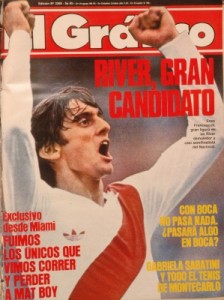South American Player of the Year. Strange voting, if one looks closer. Since it did not matter where the candidates played, it is interesting to see that no European-based player appeared among the top 10. The big names at the time are all absent. True, some were not at their best, or their clubs were not leaders, but others were playing great and still were not included. No Maradona, Socrates, Zico, Passarela, Falcao, Ardiles. Practically no Brazilians – only Eder (Atletico Mineiro) was among the top 10 – and 10th! The rest were only Argentines and Uruguayans – in equal numbers, 5 of each country. Usually players are awarded because the team were playing achieved some success, overshadowing everything else, even relatively mediocre year otherwise. But not this year – Independiente won both Copa Libertadores and the Intercontinental Cup, but had only two players voted among the top 10. One of the Argentine champions had a player among the best, the other – not. Brazil’s champion was not represented at all. On the other hand players from clubs having miserable year had players among the best – most notably Boca Juniors. The Uruguayans, strong players, no doubt, played – Fernando Morena excepted in part – for foreign clubs. Club-wise, 5 Brazilian clubs, 5 Argentine, and 1 Uruguayan had players voted in the top 10. Noticeably, the current golden generation of Brazil was absent – 4 of the 5 Brazilian clubs having a player in the top 10 featured foreigners. Even the player voted best had a checkered season at best and perhaps another one should have been awarded, but he finished only 3rd. And given the general South American preference or flamboyant strikers, it is curious to see 2 goalkeepers high on the list.
Eder (Bra) – Atletico Mineiro, and Fernando Morena (Uru) – Penarol, but playing part of the year in Argenitna, shared 10th place. Victor Diogo (Uru) – Palmeiras: 9th. Alberto Marcico (Arg) – Ferro carril Oeste: 8th. Jorge Burruchaga (Arg) – Independiente: 7th. Hugo de Leon (Uru) – Gremio, and Ricardo Gareca (Arg) – Boca Juniors: 5th. Rodolfo Rodriguez (Uru) – Santos: 4th. Ricardo Bochini (Arg) – Independiente: 3th. Ubaldo Fillol (Arg) – Flamengo: 2nd.

Enzo Francescoli was voted number 1. Given the distance of time and his reputation, nothing strange – one of the greatest players of the 1980s and some of 1990s. Since he coincided with giants like Maradona and Zico, to name only the cream of the crop, it is great to see him recognized. Then again, when one looks closer… Francescoli had a bit of checkered career so far, including this very year. Born in 1961, he debuted in 1980. A bit late, for he opted to play for his college team until finish schooling. His professional debut was not for Nacional or his early love, Penarol, but for modest Montevideo Wanderers. In fact, he left Penarol as a teenager, for he was kept generally on the bench. He also decided not to join River Plate at that time, after a try-out, and preferred to return to Montevideo and play for his school. He even postponed Montevideo Wanderers’ invitation until finishing school. Yet, he debuted young enough – 19 years old – was immediately noticed and debuted for the national team of Uruguay in 1982. In 1983 he signed lucrative for the time contract with River Plate and more or less moved permanently to the other coast of La Plata, where he lives now as well.


It is great to see him at the front age of El Grafico or captured in spectacular moments, or as a River Plate’s captain even in his first season with the club, but neither River Plate was all that great at the moment, nor Francescoli was sure starter. The inventive and elegant attacking midfielder was almost out of the team for a good part of 1983, sharing duties with another player and sitting often on the bench. He returned to steady regular place only in the late part of the season, when River Plate finally played well and eventually had a chance to win Campeonato Nacional. The dream ended in front of home crowd, where, to their shame, Ferrocarril Oeste destroyed River 3-0 and went to best them again across town 1-0. So, it was not a great season – rather, doubtful one for most of the year. Francescoli really established himself only late in the season, but it was strong end of the year for him and perhaps fresh impressions propelled him to the top in the eyes of voting journalists. It was hardly his best season. But it was hardly the best season for other stars too, so, to a point, he was lucky, for if others were in great from he was not going to be number one even if he had full excellent season. So, from time perspective, it was great to have him recognized. Still, Bochini should have been voted number one this year.
